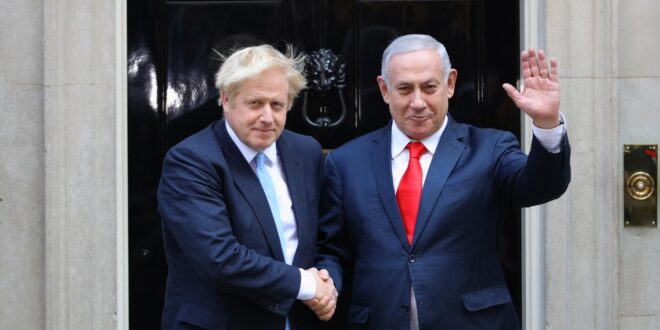The UK secretly developed a defence plan with Israel, Declassified can reveal.
According to leaked documents, the British project was codenamed HEZUK and designed to counter the “destabilising regional activity of Iran and Hizballah”.
This would be done by strengthening UK-Israel intelligence collaboration and increasing military cooperation, with the effect of deepening bilateral security integration.
Joint work on hypersonic missiles and autonomous warfare were also apparently considered during Boris Johnson’s time as prime minister.
The information comes from a presentation prepared by Britain’s defence attaché to Tel Aviv in 2020 for a visiting delegation from the UK’s Higher Command and Staff Course.
The slides indicate that Project HEZUK was inaugurated in 2019-20, while the Israeli military was gunning down peaceful protesters in Gaza during the Great March of Return.
Over 200 Palestinians – including 46 children – were killed as they tried to return to their ancestral homes, and over 36,000 were injured.
The UK government referenced HEZUK once again in March 2020 when two officers from the British army’s 77th brigade were planning to visit Israel for “capability development” on “information operations”.
A visitor request issued by the British embassy in Tel Aviv noted how the visit was “pertinent to… a programme or agreement” named “MOD project HEZUK”.
The defence plan was apparently still active as recently as last year, when British major general James Roddis visited Tel Aviv under “HEZUK” auspices.
‘Deeply entangled’
The documents originate from a hack of the Israel Defence Forces (IDF) by a group called “Anonymous for Justice”. They were published this week by Distributed Denial of Secrets.
There is strong public interest in reporting on the material. Israel is being investigated by international courts for atrocities in Gaza, has just invaded Lebanon, and conflict looms with Iran.
The UK Ministry of Defence (MoD) refuses to publish a military pact it signed with Israel in December 2020 which could relate to the HEZUK project.
Former British soldier Joe Glenton, who works for campaign group ForcesWatch, told Declassified: “These leaks show once again how deeply entangled the UK is with Israel.
“It has to raise a number of ethical questions given the ongoing genocide in Gaza – and now the assault on Lebanon, itself a UK ally whose army is being trained by British troops”.
He added: “the public urgently need to know if the military and intelligence engagements detailed in these documents, which appear to date back a few years now, are still live programs. Because if they are, British military and intelligence personnel are being put to work supporting a genocidal state”.
The MoD refused to clarify whether HEZUK was ongoing.
A UK government spokesperson said: “We regularly work with partners and allies across the Middle East to contribute to regional security. This includes intelligence sharing, where it benefits our national security, as well as defence industrial collaboration, which supports UK economic growth”.
HEZUK
The defence plan focussed on five key areas, the leaked presentation shows.
Those included strengthening the intelligence relationship, improving military capabilities, liaising with the Israeli security establishment, seeking defence prosperity opportunities, and accessing overflight permissions.
The “HEZUK Planning Directive” specifically refers to Israel’s Defence Intelligence Special Operations Directorate, although further details appear to be redacted.
Declassified reported yesterday that IDF information operations specialists visited the British army’s psychological warfare unit, the 77th brigade, in 2019. A follow-up visit of British military officers to Tel Aviv was listed as part of the HEZUK project.
With regards to military liaison, the HEZUK Planning Directive refers to such issues as “force development and exercise”, “information exploitation”, and “land precision strike”.
Additional slides on defence “capability” list a number of “MoD programmes with potential Israeli solutions”.
That included “hypersonic air-surface weapon (Rampage)” and “Next Generation Operational Training”.
Britain and Israel were already working together on drones, air defence and loitering munitions, with plans to jointly investigate space, maritime and autonomous (AI) warfare domains.
The UK’s growing reliance on Israel’s arms industry has created fears that an arms embargo on Tel Aviv could trigger reciprocal measures, hampering Britain’s own military capabilities.
The Royal Artillery regiment uses the Exactor 2, a rocket with a 25km range made by Israel’s state-owned arms firm Rafeal. Army planners are seeking to upgrade this to a weapon capable of firing 80km.
Proscribing Hezbollah
Britain’s defence plan with Israel appears to have been drawn up in 2019, months after the UK proscribed all of Hezbollah as a terrorist organisation.
The political wing of the Lebanese movement had long remained legal in Britain, partly due to its members holding cabinet posts in Lebanon’s democratically elected government.
Declassified reported last week on how the total proscription of Hezbollah “came after intense lobbying by pro-Israel groups within Westminster”.
Another key development in the Middle East at this time was the Trump administration’s withdrawal from the Iran nuclear deal, which ripped up the main avenue for Western rapprochement with Iran.
Ex-British soldier Joe Glenton added: “If this latest material hadn’t been uncovered we’d never have known about it”.
He said: “When it comes to war and foreign policy – including our relationships with states currently under investigation for genocide – the UK is little more than a dictatorship, concealing from the public key details of relations with Israel, the most violent and destabilising state in the Middle East”.
 Eurasia Press & News
Eurasia Press & News



